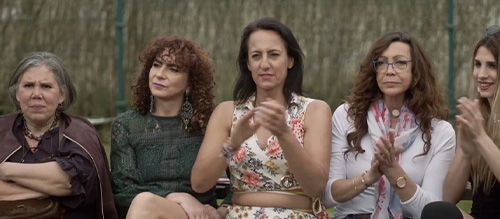Sediments (2021) Review – BFI Flare

Sediments (2021)
Director: Adrián Silvestre
Screenwriter: Adrián Silvestre
Just as the Earth is, our inner selves are made up of many layers that make up our identity and tell the story of our existence.
The above is how Sediments was introduced to film festival audiences and is the prevalent theme throughout this documentary on gender transition, never more clearly than when the film’s subjects stop next to a spectacular natural quarry with thematically appropriate layers of sedimentary rock, layers of being, exposed to the outside world.
We follow a group of Spanish trans women who gather at a countryside retreat to share their unique life experiences and to offer support to each other, particularly to Cristina who is just about to commit to her gender transition, a moment in her life that feels like “teetering on the edge of a cliff”.
The documentary opens with an incredibly simple but powerful scene where the group casually swap stories of their transition journey and struggles over lunch. The path to becoming their true selves proves to have been far more traumatic for those of an older generation. To take the extreme examples, younger members of the group Lena and Alicia both made the change between semesters at university and got little more than some strange looks and whispered comments from their fellow students, but decades ago Yolanda was subject to brutal police violence on multiple occasions while earning a living on the streets as a sex worker.
The film quotes a shocking 80% unemployment rate among trans women in Spain. “Trans people are humans beings and as such have the right to a job… but society doesn’t allow it”. Whatever stage of a transition a person might be at, everyone should have the right to work, to access healthcare, to live, but many societies have a long way to go before acceptance of everyone for who they are.
Lena discusses with her mother and grandmother back home in Barcelona the day she came out as trans, and thankfully she has been supported every step of her journey by her family. Not everyone is so lucky to have such a strong support network to ease them through the changes and there may still be more bad coming out experiences than good, but much of the world is slowly changing in this regard, coming to understand.
These are real people talking about their real experiences with each other but they don’t acknowledge the camera and no other documentary conventions are noticeably incorporated. Dialogue aside, the group aren’t even introduced to us by name with on-screen captions until the very final “you have been watching” sequence of the film. The camera is completely non-disruptive, fly on the wall. Not even a take of quiet contemplation that was spoiled by a train passing in the background is cut out.
There is such a lovely chemistry within the group, where dynamics and dominant personalities ebb and flow as they get to know each other. On a tour of a cave, they all joke about stalactites resembling vaginas before frankly discussing vaginoplasty surgeries and playing an absolutely filthy game of “never have I ever“ in the following scenes.
Egomania is not the same as narcissism, but there is an element of it frequently commented on in relation to Cristina’s story compared to the experiences of the rest of the group; she sees herself as inferior, as not being as strong or knowledgeable as the others for only beginning her transition in her 50s, and this often comes out as childish passive-aggressive behaviour towards others. Of course everyone’s journey to self-acceptance is very different, but others in the group clearly struggle to be there for Cristina when she is being particularly difficult or combative.
The documentary’s participants are often physically and emotionally exposed in-camera, but it never feels gratuitous or unnecessary, just honestly portraying who they are.
The most hard-hitting sequence in the film sees Yolanda lying on a bed with Lena and Alicia recounting her harrowing story of her battle with cancer that resulted in the loss of her voice and her going into a coma, only to be greeted by her estranged family in hospital upon her waking. The same family had never supported her until that point, and this moment seemingly gave her the stubborn impetus to carry on living and not give them the satisfaction of seeing her in her deathbed. Family is often chosen when yours isn’t there for you when you need them.
While not everyone in Sediments gets their chance to shine (like in any group, the loudest get the most attention), it remains a fascinating account of a few of the many different experiences of gender transition and how much easier it can be with the right people at your back. Director Adrián Silvestre steps back and lets the group have authorship of their own stories, and simply documents their time together as a loving and sympathetic surrogate family.
“The world has two gender extremes, man and woman. But in the middle, there are a lot of ways to express yourself”.
21/24

